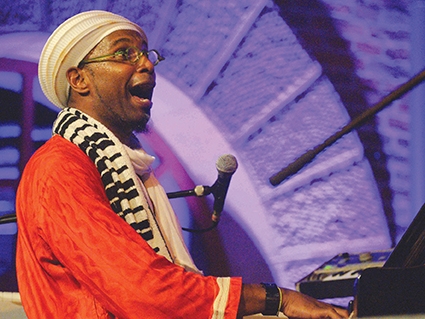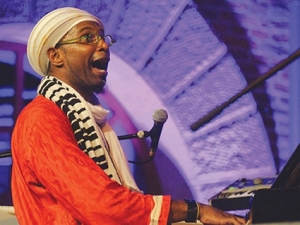Jazz Series 2016 Closes with the Birth of a New Jazz Trend
On April 20, due to illness, Roy Hargrove was replaced on the stage by an Afro-Cuban quartet headed by Omar Sosa, which had been scheduled for May and whose job it became to close the Jazz Series 2016- a surprise climax and a show of new discoveries.
Omar Sosa, composer-pianist-bandleader, was born in 1965 in Camagüey, Cuba’s largest inland city. At age eight, he began studying percussion and marimba at the music conservatory in Camagüey; in Havana, as a teenager, he took up piano at the prestigious Escuela Nacional de Música and completed his formal education at the Instituto Superior de Arte in Havana. Among his influences, Omar cites traditional Afro-Cuban music, European classical composers (including Chopin, Bartok, and Satie), Monk, Coltrane, Parker, Oscar Peterson, Herbie Hancock, Chick Corea, Keith Jarrett, Chucho Valdés, and the pioneering Cuban jazz group Irakere. Moving in 1993 to Ecuador, Omar immersed himself in the folkloric traditions of Esmeraldas, the northwest coast region whose African heritage includes the distinctive marimba tradition. He relocated to the San Francisco Bay Area in 1995, and soon invigorated the Latin jazz scene with his adventurous writing and percussive style. His Tbilisi concert was no less diverse.
Very soon after emerging on stage, cha-cha-cha rhythms were heard all around, drawing the audience to its feet, clapping hands and grinning in pleasure. It is warming to think that this small Cuban nation, having suffered so much, has such vigor to cheer. Their music made me imagine the sunrise, sunset and the tide, as if I were floating in the Caribbean Sea. It had everything - energy, cheer, lyricism, sunny mood, placidity – I would qualify it in three words – a Musical Pacific Oceanarium, with four goldfish inside. The costumes matched their diverse stylistics.
Annually performing over 100 concerts on six continents, Omar has appeared in venues as wide-ranging as the Blue Note (New York, Milan, and Tokyo), Carnegie Hall’s Zankel Hall, Boston’s Museum of Fine Arts, Chicago’s Museum of Contemporary Arts, the Philadelphia Museum of Art, th e Detroit Institute of Arts, the Walker Art Center, the Getty Center, London’s Barbican and Queen Elizabeth Hall, Glasgow’s Royal Concert Hall, and Berlin’s Haus der Kulturen der Welt; festivals including Monterey Jazz, JVC Jazz, Montreal Jazz, Marciac Jazz, North Sea Jazz, Helsinki, Grenoble Jazz, Montreux Jazz, Naples Jazz, Ravenna Jazz, Roma Jazz, Spoletto, WOMAD, and Cape Town International Jazz; and universities on several continents, including a visiting artist fellowship at Princeton University in March 2008, and a visiting artist residency at Dartmouth College in April 2008.
Sosa received a lifetime achievement award from the Smithsonian Associates in Washington DC in 2003 for his contribution to the development of Latin jazz in the United States. He has received two nominations from the BBC Radio 3 World Music Awards, in 2004 and 2006, both in the ‘Americas’ category. In 2003 he received the Afro-Caribbean Jazz Album of the Year Award from the Jazz Journalists Association in NYC for his recording of ‘Sentir;’ and a nomination from the Jazz Journalists Association for Latin Jazz Album of the Year in 2005 for his recording of ‘Mulatos.’
After a stream of applause, GEORGIA TODAY heard from musicologist Nodar Broladze: “This is a new direction we are witnessing the birth of- just as bee-bop was born during the Second World War. This was a symbiosis of Latin, African and American music. The complexity of this genre is that it represents a mix of coloring melodies peculiar to Cuba. Yet, these musicians grew up abroad. We have seen how effective their performing art and composing thinking is. This is music that young people will like very much. We, the older generation, understand it as it is based on bee-bop, but enriched with experiments. Not everyone may like it, but in my opinion, this is the biggest event in our cultural life. This was an attempt by oppressed Cubans to push their sorrow into the bigger space- to touch those less interested in it. Nevertheless, I believe that they live much more happily than rich people in other countries with other concerns and lacking spiritual wealth. Cubans are still joyful. There was one philosopher in the Middle Ages, who said that it is more important to have the ability to take pleasure from trifles than to be able to think. Sosa’s music is saturated with this attitude.”
Maka Lomadze











